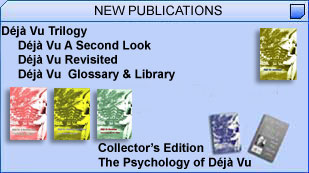Déjà Vu Questionnaire
We have also developed several less
commonly used paper and pencil neuropsychiatric instruments
which are applied when appropriate.
The Neppe Déjà Vu
Questionnaires are other screening history instruments
seldom used in clinical practice. However, the major
value of this well validated instrument is to demonstrate
how we cannot interpret symptoms not elicited in detail
as the same. Using a phenomenological analysis, Neppe
was able to demonstrate that the symptom of déjà
vu, commonly regarded as symptomatic of temporal lobe
epilepsy indeed had a very special phenomenologic
quality in patients with temporal lobe epilepsy (Neppe,
1983A). This involves its association with post-ictal
features such as sleepiness, headache and clouded
consciousness and its link in time with these features.
This association provides an excellent clue to the
existence of temporal lobe epilepsy but déjà
vu is a normal phenomenon occurring in 70 percent
of the population and unless such phenomenological
detail is obtained, patients' symptomatology may be
misinterpreted (Neppe, 1983 A). Neppe has similarly
done such a study with olfactory hallucinations (Neppe,
1983 B, 1984). A specific type of temporal lobe epilepsy
olfactory hallucination could not be demonstrated
although there were suggestive features.
A major message, therefore, may be
the relevance of adequately assessing in detail
the symptomatology of patients. If déjà
vu occurs, temporal lobe epileptic déjà
vu must be specifically sought. Such detail may be
as relevant as electroencephalographic monitoring
(Neppe, 1983 A ).
See The
Psychology of Déjà Vu for further
reading.
See
more on déjà vu.

